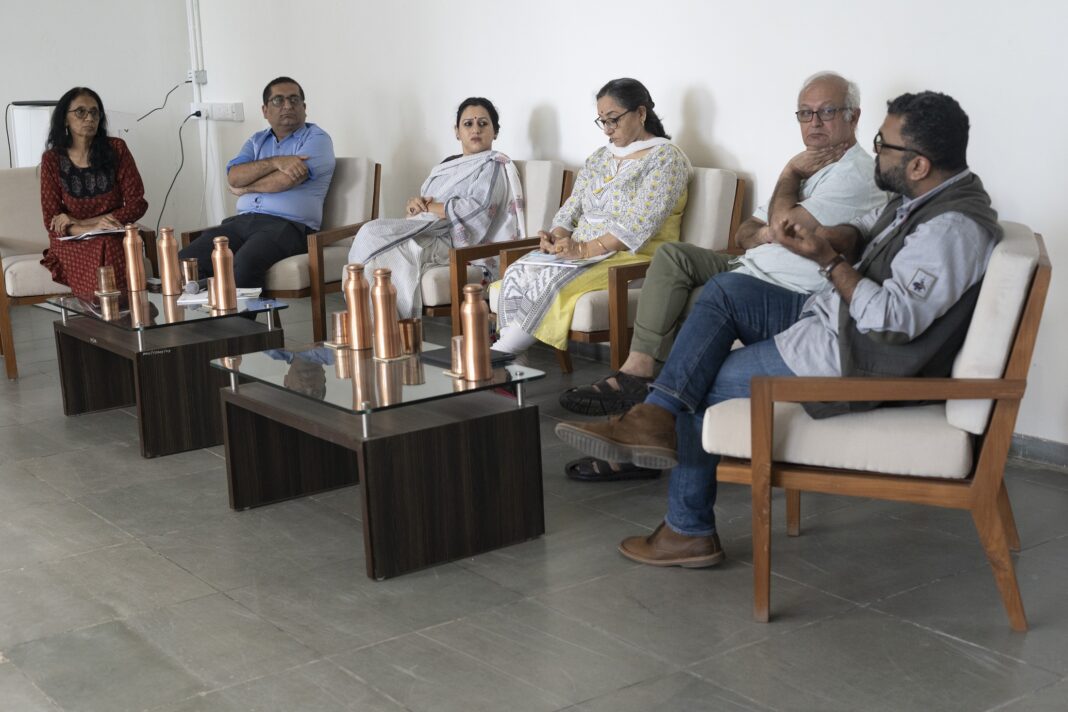New Launches
Anant National University launches Research Report, ‘Shelter Solutions for Migrant Construction Workers’


Ahmedabad, September 16, 2022: Anant Centre for Sustainability at Anant National University, Ahmedabad and the Terwilliger Centre for Innovation in Shelter at Habitat for Humanity, launched a research report on Shelter Solutions for Migrant Construction Workers. The research aims to develop an overall understanding of the housing challenges of migrant construction workers, especially in terms of implications following the COVID 19 pandemic related lockdown imposed in India from spring 2020. The data-driven research report also provides unique and practical housing solutions for migrant workers in the construction sector.
Anant Center for Sustainability & the Terwilliger Centre for Innovation in Shelter at Habitat for Humanity collaborated to study the housing challenges of migrant construction workers who make up 41.6% of short-term and 5.3% of long-term migrants of rural origin across India. Researchers Sharadbala Joshi, Dhaval Monani, Asima Sahu and Anurita Bhatnagar focused on western India, specifically Maharashtra, a state that attracts the maximum number of inter-state migrants. The findings of this primary data-driven research inform policymakers and private companies in the construction sector of the aspects related to social infrastructure and housing that are critical to migrant workers.
The research focussed on the journey of the migrant construction workers from the villages to the cities to understand certain key parameters like the kind of accommodation they looked for in the cities, with whom did they share it, the reasons that prompted them to return to the villages during the COVID-19 lockdown, in what ways has life changed for them since their return to the city post-pandemic, and what kind of housing solutions would work best for them. This involved a survey in 3 rural districts across the states of Bihar, Uttar Pradesh and Odisha where construction labour migrate from, and surveys in the cities of Mumbai-Navi-Mumbai-Panvel-Vasai (MNM-PV) and in Pune and Pimpri Chinchwad (Pune-PCMC) where construction labour work in.
The research in the rural districts showed that 74% of the respondents went to the city when ‘recruited’/ invited by labour contractors. Consequently, they lived in or rented formal houses that the contractors identified. 37% of the respondents stated that they lived in large rooms that they shared with 5 persons. Some respondents stated that due to the COVID-19 pandemic, they prefer to work in the village itself or in nearby urban areas where they may earn a little less but from where they can return home more easily. During the first lockdown, some of the respondents did not leave the city and faced a difficult time since they could not get any work and they had no income. However, when the second lockdown was declared, the workers did not go back to the village because they were getting 3 meals a day from political parties or ration from local police stations or help from neighbours. Some respondents who had migrated to the city through a contractor observed that although work availability slowed down after the lockdown in 2020, their contractor made some adjustments and is continuing to provide them with work.
The research found that a significant 85% of respondents from MNM-PV are interstate migrants and 79.5% of migrants in Pune-PCMC are from within Maharashtra. 29% and 95% of respondents found their houses independently in MNM-PV and Pune-PCMC, respectively. Despite the push for pucca houses under the Pradhan Mantri Awas Yojana – Urban, 37.3% of respondents in Mumbai live in kuccha accommodation and the same is at 80% in Pune-PCMC. The study, while identifying the day-to-day challenges faced in their settlements, deduced the fact that 36% of respondents in MNM-PV pointed to poor conditions of toilets and washing facilities and limited timing and quantity of water supply. A staggering 31% of respondents in MNM-PV said that one of the main reasons for them to return to their respective villages in March 2020, was finding “No opportunities to earn income” in the city.
Based on these crucial findings, the research report attempts to explore alternative affordable housing options for migrants. These include short-term accommodation options with flexible tenure and access to basic services, co-living accommodation, as well as on-site portable shelters. On the latter, the students also built a prototype with the leftover tarpaulin from the emergency response auto rickshaws built by the Anant Centre for Sustainability during the pandemic, to create cross-laminated and insulated tarpaulin units.


Speaking about the research report, Miniya Chatterji, CEO, Sustain Labs Paris and Founding Director Anant School for Climate Action and Anant Centre for Sustainability said, “We have been actively engaged in innovating with implementing practical solutions to serve the most disadvantaged sections of the society who were hit the hardest by the pandemic. During the pandemic, we established 28 COVID care quarantine centres and temporary hospitals equipped with medical devices across 5 states. We also transformed the humble autorickshaw to design, create and put on-the-road emergency oxygen response vehicles and mobile COVID testing facilities in 2 states. In the same pioneering spirit, Anant Centre for Sustainability is recommending innovative, alternative and affordable solutions in this report for improving the living conditions of migrant construction workers so that they never have to flee again if disaster again strikes”.
About Anant National University
Anant National University has been a pioneer in sustainability and technology education since its inception, offering courses such as Bachelor of Design, Bachelor of Architecture, Master of Design and Master of Architecture. Since 2020, AnantU has been offering the much-coveted Anant Fellowship for Climate Action, a unique one-year immersive global programme for climate change solutionaries. The Fellowship is a member of MIT Solve and is aimed at creating a community of climate change trailblazers who collaborate and cross-pollinate each other’s work with ideas and expertise from across sectors, regions and generations. Using design thinking, all programmes at AnantU provide students with the opportunity to learn and contribute to sustainable solutions. The university’s extensive Maker Space is equipped with tools including a hi-tech digital manufacturing laboratory and electronics workbench.
-



 Interviews4 weeks ago
Interviews4 weeks agoHigh Rental Yield, Price Appreciation, Stable Growth, Make Sydney an Ideal Realty Investment Option: Haansal Estate
-



 News3 weeks ago
News3 weeks agoManasum Senior Living Launches IKIGAI GOA, A Senior Living Community in North Goa, in collaboration with Prescon Homes
-



 News2 weeks ago
News2 weeks agoKW Delhi 6 Mall Onboards New Brands
-



 News3 weeks ago
News3 weeks agoBridging India Divide: Top 5 Tier- 2 Cities to Focus On
-



 News1 week ago
News1 week agoGodrej Properties Sells Rs 3k cr+ Homes of Godrej Zenith, Gurugram, within 3 days
-



 News2 weeks ago
News2 weeks agoCommercial Realty Gets Tech Savvy: Fast Construction, Enhanced Convenience
-



 News3 weeks ago
News3 weeks agoMultipoint Connection – A Definite Boon
-



 News2 weeks ago
News2 weeks agoRBI’s Status Quo on Key Policy Rates to Help Maintain the Real Estate Growth Momentum, Say Industry Stalwarts

















